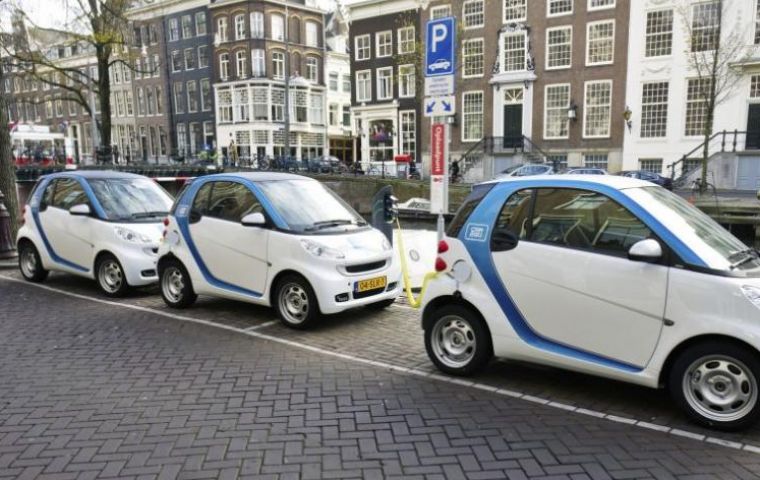MercoPress. South Atlantic News Agency
Europe's push for drastic shift towards electric vehicles may find objections
 The measures proposed by the EC would “create a market for sustainable alternative fuels,” Vălean has said
The measures proposed by the EC would “create a market for sustainable alternative fuels,” Vălean has said The European Commission has voted last week to ban the sale of vehicles that run on gasoline or diesel by the year 2035 to change the energy matrix in transport.
The EC proposals need to be approved by the European Parliament before becoming law - and reports suggest they could meet resistance from member states.
The international community is gradually moving from fossil fuels to environment-friendly sources. For the time being, the strategy is to encourage the purchase of either hybrid (which run on both electricity and petrol) or fully electric cars.
The EU’s executive branch has proposed a 55% cut in vehicular CO2 emissions from current levels by 2030, rising to 100% by 2035, which would effectively make it impossible to sell non-electric vehicles within the EU’s 27 member states.
Adina-Ioana Vălean, the EU’s commissioner for transport, said the measures would “create a market for sustainable alternative fuels and low-carbon technologies while putting in place the right infrastructure to ensure the broad uptake of zero-emission vehicles and vessels.”
She also pointed out that “this package will take us beyond greening mobility and logistics. It's a chance to make the EU a lead market for cutting-edge technologies.”
The 2035 target is essential since cars are believed to last 15 years at most so that starting in 2050 only electric cars can be marketed.
A report carried by Madrid's newspaper El País explained that ”the Commission is thus aligned with what some countries were already proposing, with what several European companies had put on the table and with the preferences that consumers are showing to a great extent.“
The Spanish analysis also specifies that ”the measure is a message to European manufacturers to accelerate their transformation towards the electric car and a warning to foreign firms to change if they want to continue doing business in Europe.“
But changes also hit consumers or potential buyers of a new car during 2021, who, the EC has made clear, may rest assured that they will indeed be able to drive a fossil fuel vehicle until the ban takes effect, in which time tens of millions of these types of cars will be sold across Europe until 2035 and will be allowed to circulate even after then.
Drivers are also scared by the price of electric vehicles, which today are more expensive than combustion ones, but the EC hopes that will change with mass production and when the cost of batteries falls. According to manufacturers, parity is expected to be reached between 2025 and 2030.
Regarding the fate of old-fashioned cars, analysts believe it will not be much different from that of old aeroplanes and ships and even present-time cars: scrapping. But additional incentives to change vehicles are expected to be introduced to speed up the conversion into fully electric vehicles.
A specialist consulted by the AFP agency also warned that ”a large number of cars will become obsolete and probably will not have the right to circulate in some urban areas. Therefore, their residual value could fall drastically.”
At the same time, it is believed that fewer cars will be needed as more public transport, bicycles and carpooling will be used in cities.
And there is also the choice of installing an electric engine in an older car.
In 2015 barely a million electric cars were circulating in the world, the figure rose to three million in 2017. In 2020, a figure of around 5 million was handled and by 2040 the projections point to 530 million, according to Bloomberg, as new technology vehicles become more affordable.
Leading the path towards the new matrix are China (45%), the United States (22%) and the European Union (24%), while Uruguay and Chile are frontrunners in South America.
The new targets are a substantial increase in the current measures, which currently require a 37.5% reduction in CO2 emissions by 2030. Those goals, which are becoming increasingly tougher, have already forced car manufacturers to dramatically increase their electrified vehicle offerings to avoid heavy EU fines.
Significantly, the proposals include removing the exemption from the emission rules for small volume manufacturers – those who produce between 1000 and 10,000 new cars per year – would be removed under the new proposals.
The new goal brings the EU broadly in line with the UK’s targets. The UK government will ban most new non-zero-emissions cars and vehicles by 2030, although certain plug-in hybrids will be allowed to remain on sale until 2035.
Several major car brands, including Bentley, Ford, Opel, Vauxhall and Volvo, have already outlined plans to switch to entirely electric fleets in Europe by 2030.
The European Commission’s proposals also include legislation to boost the infrastructure required for mass EV uptake “in line with zero-emissions car sales”.
That includes a requirement that, by 2025, member states install public charging points along major roads at intervals of no more than 60km (37 miles) for battery EVs and 150km (93 miles) for hydrogen fuel cell EVs.




Top Comments
Disclaimer & comment rulesCommenting for this story is now closed.
If you have a Facebook account, become a fan and comment on our Facebook Page!